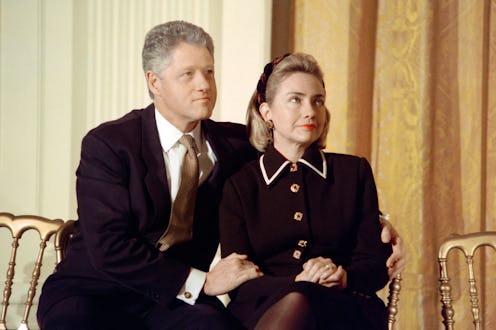News
3 Times Hillary Handled Sexism As First Lady
Democratic frontrunner Hillary Clinton is no stranger to misogynistic comments. Politicians and members of the press have lobbed gender-based insults at Clinton starting from her time as first lady to the first rumors surrounding her 2016 presidential bid. Even reporters who should know better have made sexist questions toward Hillary Clinton that boil down to whether she's likable enough to lead, judgments about her appearance and tone of voice, and assumptions about her capacity to make policy decisions. The tendency is so latent in coverage of Clinton that a group calling themselves the HRC Super Volunteers launched a campaign this spring to call attention to the sexist language reporters use when talking about Hillary Clinton — words and phrases like "ambitious," "tired," "entitled," "worn out," and "will do anything to win."
Just this week, former Australian Prime Minister Julia Gillard offered the candidate some unsolicited advice on dealing with sexist statements that are guaranteed to crop up during the Clinton presidential campaign: Call out sexism early because it isn’t going away. During her remarks at a Fortune magazine summit in London this week, Gillard said that Clinton would have to battle a stereotype that "likability and women and leadership don’t go together."
Gillard is right because the idea that women in power should concern themselves with being likeable is one that Clinton has been dealing with from the very first moments she and husband Bill Clinton stepped into the political arena. For example, during Bill’s first campaign for President, Richard Nixon told The New York Times that Hillary should dumb down to make Bill look stronger:
If the wife comes through as being too strong and too intelligent, it makes the husband look like a wimp.
The gender-based criticisms followed Clinton into the White House during her time as first lady. Rather than consider her contributions to law, child advocacy, or healthcare issues, journalists focused on her hair, clothing choices, and marriage. Of course, Clinton has never been shy about delivering tough, on-the-spot comebacks to sexist statements. But these three early examples of sexist questions put to Clinton show that people have been using tired gender stereotypes for nearly 30 years to reduce her record of public service.
1. The Time Good Morning America Asked For Details On Her Marriage
The morning after Bill's 1998 State of the Union Address, Hillary appeared on Good Morning America. Instead of being asked about the president's policy agenda, Hillary was forced to respond to questions about her marriage and Monica Lewinsky, including insulting "Do you believe he's told you the whole story?" Not only is this extremely personal and invasive, it plays into a false assumption that somehow Hillary owes the public insight into the couple’s private conversations. Would a man have gotten this question?
2) The Time She Was Asked How She "Does It All"
Over the years, reporters have asked Clinton the same question in a variety of forms: how do you maintain balance? How do you do it all? What advice do you have for women trying to do it all? The underlying assumption is that women are somehow incapable of fulfilling several roles at the same time.
3. The Time Matt Lauer Asked If She Was "Numb" To The Talk About (You Guessed It) Her Marriage.
LAUER: Are you saying that you no longer — this doesn’t upset you anymore? You’re almost numb to it?CLINTON: It’s not being numb so much as just being very experienced in the unfortunate, mean-spirited give-and-take of American politics right now. So having seen so many of these accusations come and go, having seen people profit, you know, like Jerry Falwell, with videos, accusing my husband of murder, of drug running, seeing some of the things that are written and said about him, my attitude is, you know, we’ve been there before, we have seen this before. And I am just going to wait patiently until the truth comes out.
For obvious reasons, the Clintons' marriage was in the public eye in the 1990s. What's disturbing is the tendency among members of the press to make judgments about Hillary's emotional state based on her response to the headlines. For instance, Hillary addressed the Lewinsky scandal with Today host Matt Lauer and was asked whether she was "numb" to the charges of infidelity against her husband.
Nearly 20 years later, some members of the press still have trouble imagining that Clinton (or any woman) has the capacity to lead the country. But if history is any indicator, she isn't afraid to fight against their sexist way of thinking.
Image: Getty Images (1)
